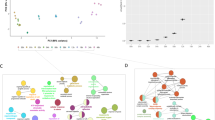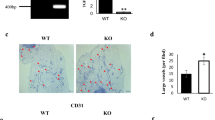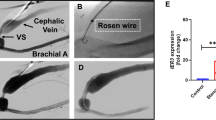Abstract
Enhanced extracellular matrix (ECM) accumulation is an important finding in human restenotic arterial neointima after angioplasty. Transforming growth factor β1(TGF-β1) is known to regulate the synthesis and turnover of a variety of ECM components, and may play an important role in restenosis. Recombinant adenoviral vector expressing an ectodomain of the TGF-β type II receptor fused to the human immunoglobulin Fc portion (AdTβ-ExR) inhibits the action of TGF-β probably either by adsorbing TGF-β or by acting as a dominant negative receptor. We carried out a catheter-based local adenovirus mediated gene delivery using an Infiltrator in porcine coronary arteries to know the pattern of gene expression, efficacy and procedural complications. Twenty four coronary arteries in 13 pigs were used for intravascular gene delivery by intramural injection with either AdTβ-ExR or adenovirus expressing b-galactosidase (AdCALacZ). Direct immunofluorescent staining and reverse transcription polymerase chain reaction (RTPCR) were used for detection of type II TGF-β receptor and its mRNA respectively. X-Gal histochemistry was performed to identify b-galactosidase. Both soluble TGF-β receptor and b-galactosidase were expressed locally in the media and adventita at injected arterial segments without any significant dissemination to remote area. Intravascular gene transfection performed with various titer of each adenoviral vector showed that AdTβ-ExR of 5x10(8) pfu and AdCALacZ of 2.5 x 10(8) pfu were the minimum titer for the expression of each transgene. Infiltration of CD3 positive T cells was detected by immunohistochemical staining in the area of each transgene expression, and tends to decrease over time after gene delivery. Pathological study of 24 treated arteries showed complications such as disruption of external elastic lamina with hemorrhage (n = 4), minimal disruption of internal elastic lamina and endothelial layer, and medial thickening. In conclusion, catheter-based local intravascular gene delivery of adenoviral vector is feasible and effective in a selected artery, but must be undertaken with caution due to possible lethal complications. Local delivery of soluble TGF-β type II receptor in this way may provide an effective intravascular gene therapy to inhibit TGF-β signal pathway without any significant systemic side effect.
Similar content being viewed by others
Article PDF
Author information
Authors and Affiliations
Rights and permissions
This is an Open Access article distributed under the terms of the Creative Commons Attribution Non-Commercial License (http://creativecommons.org/licenses/by-nc/3.0/) which permits unrestricted non-commercial use, distribution, and reproduction in any medium, provided the original work is properly cited.
About this article
Cite this article
Chung, IM., Ueno, H., Kim Pak, Y. et al. Catheter-based adenovirus-mediated local intravascular gene delivery of a soluble TGF-β type II receptor using an Infiltrator in porcine coronary arteries: efficacy and complications. Exp Mol Med 34, 299–307 (2002). https://doi.org/10.1038/emm.2002.42
Published:
Issue date:
DOI: https://doi.org/10.1038/emm.2002.42
Keywords
This article is cited by
-
Delivery of viral vectors for gene therapy in intimal hyperplasia and restenosis in atherosclerotic swine
Drug Delivery and Translational Research (2018)



